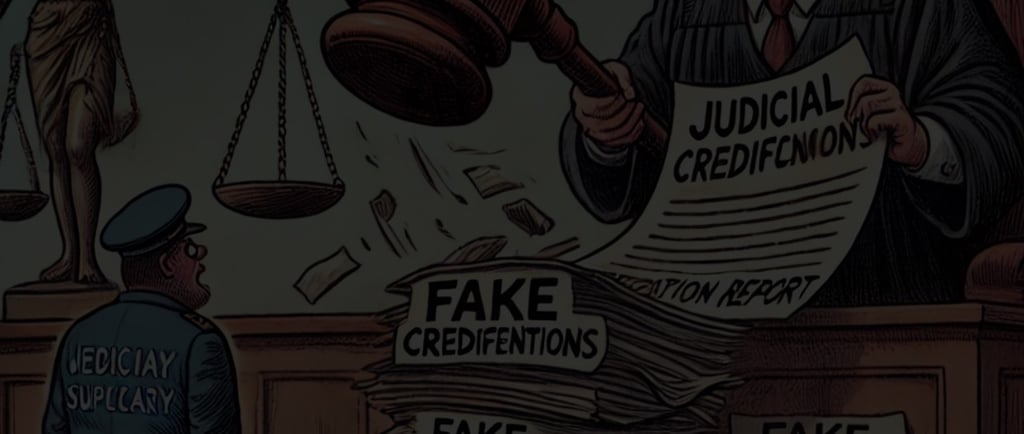Madhya Pradesh High Court Slams Misrepresentation in Recruitment: Upholds Termination of Registrar Appointment
Madhya Pradesh High Court overturned a prior decision by a Single Judge in the contentious case concerning the dismissal of Dr. Ranjan Kumar Pradhan as Registrar of Dr. Hari Singh Gour University, Sagar. The ruling, delivered on November 14, 2024, emphasizes procedural compliance and transparency in employment disputes, while reaffirming the University's right to maintain integrity in recruitment.
11/19/20243 min read


Madhya Pradesh High Court overturned a prior decision by a Single Judge in the contentious case concerning the dismissal of Dr. Ranjan Kumar Pradhan as Registrar of Dr. Hari Singh Gour University, Sagar. The ruling, delivered on November 14, 2024, emphasizes procedural compliance and transparency in employment disputes, while reaffirming the University's right to maintain integrity in recruitment.
Background
Dr. Ranjan Kumar Pradhan was appointed as Registrar of the University on December 29, 2022, following recommendations by a Screening and Selection Committee. His application, supported by professional certifications, claimed substantial experience in academic administration and research. However, subsequent verification revealed inconsistencies, including a misrepresentation of his tenure at the NITI Aayog, where he served in an ad-hoc capacity rather than in a regularized position.
The University's Executive Council, acting on findings from an inquiry committee, issued a show-cause notice to Dr. Pradhan. Dissatisfied with his response, the Council annulled his appointment on December 1, 2023, citing a lack of requisite qualifications and alleged false claims in his application.
Initial Judgment
Dr. Pradhan challenged the University's decision in Writ Petition No. 29611/2023, leading to a ruling by the learned Single Judge on May 31, 2024. The court held the University's decision violated principles of natural justice as no formal departmental inquiry preceded the termination. Consequently, the Single Judge ordered Dr. Pradhan's reinstatement with full consequential benefits.
The Appeal and Key Arguments
Aggrieved by this decision, the University filed an intra-court appeal, asserting its right to revoke appointments obtained through misrepresentation. The University contended that:
Dr. Pradhan did not possess the advertised qualifications, particularly 15 years of requisite administrative experience.
Verification from NITI Aayog confirmed that Dr. Pradhan's substantive position was as a Senior Research Officer in Pay Level 11, contrary to his claims of holding a Deputy Advisor position in Pay Level 12.
The cancellation of his appointment adhered to procedural fairness, as a show-cause notice was issued and his response considered.
Counsel for the respondent, Dr. Pradhan, argued that his credentials were valid and endorsed by the Selection Committee. He emphasized procedural lapses by the University and claimed that the termination was punitive, necessitating a formal inquiry under the Central Civil Services Rules.
Division Bench Ruling
The Division Bench, comprising Hon’ble Justice Sanjeev Sachdeva and Hon’ble Justice Vinay Saraf, meticulously examined the case. The court observed:
Misrepresentation and Qualification: Verification reports from NITI Aayog and the Debts Recovery Tribunal (DRT) established that Dr. Pradhan’s claims regarding his tenure at Pay Level 12 were incorrect. Misrepresentation of material facts justified the cancellation of his appointment.
Natural Justice and Inquiry: The court clarified that a full departmental inquiry is unnecessary when termination is due to misrepresentation during recruitment. A show-cause notice suffices, provided the respondent is given an opportunity to defend. The University fulfilled this obligation.
Scrutiny and Accountability: The court criticized the initial acceptance of Dr. Pradhan’s credentials without thorough verification. However, it held that this did not absolve the respondent from consequences of misrepresentation.
The Bench cited precedents, including Meghmala v. G. Narasimha Reddy (2010) and Devendra Kumar v. State of Uttaranchal (2013), underscoring that appointments secured through fraud or misrepresentation cannot withstand judicial scrutiny.
Conclusion and Impact
In its final order, the Division Bench allowed the University's appeal, setting aside the Single Judge’s ruling. It upheld the resolution passed by the Executive Council to terminate Dr. Pradhan’s appointment, asserting that no procedural irregularity or illegality occurred in the process.
This judgment reinforces institutional autonomy and the principle that transparency and integrity are paramount in recruitment. By upholding the University's actions, the court sends a strong message about accountability and fair practices, ensuring that educational institutions remain safeguarded against misrepresentation.
For Dr. Hari Singh Gour University, this ruling is a vindication of its efforts to uphold recruitment standards. For academic and administrative professionals, it underscores the importance of accurate and truthful representation of qualifications.
